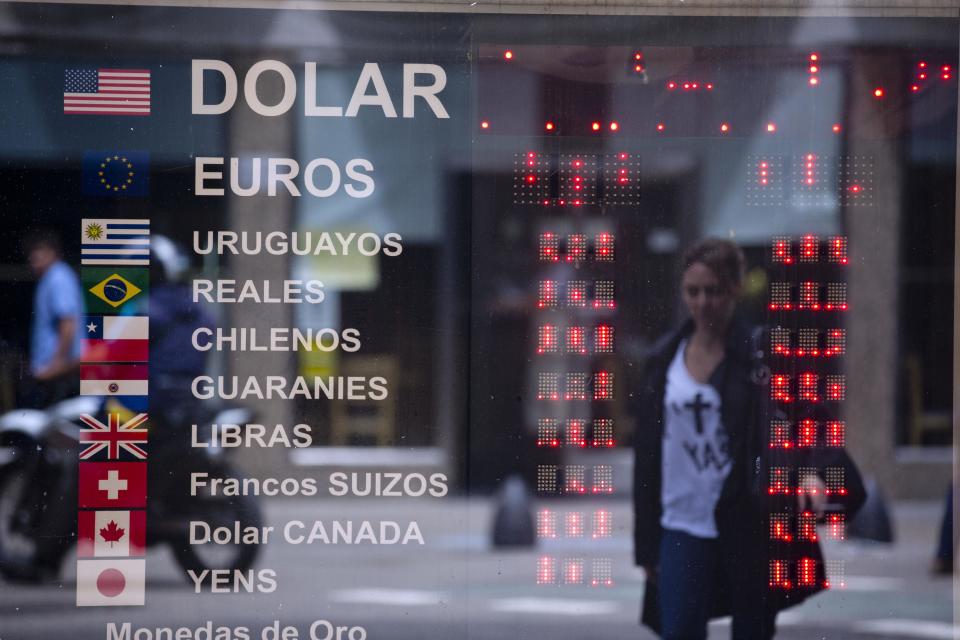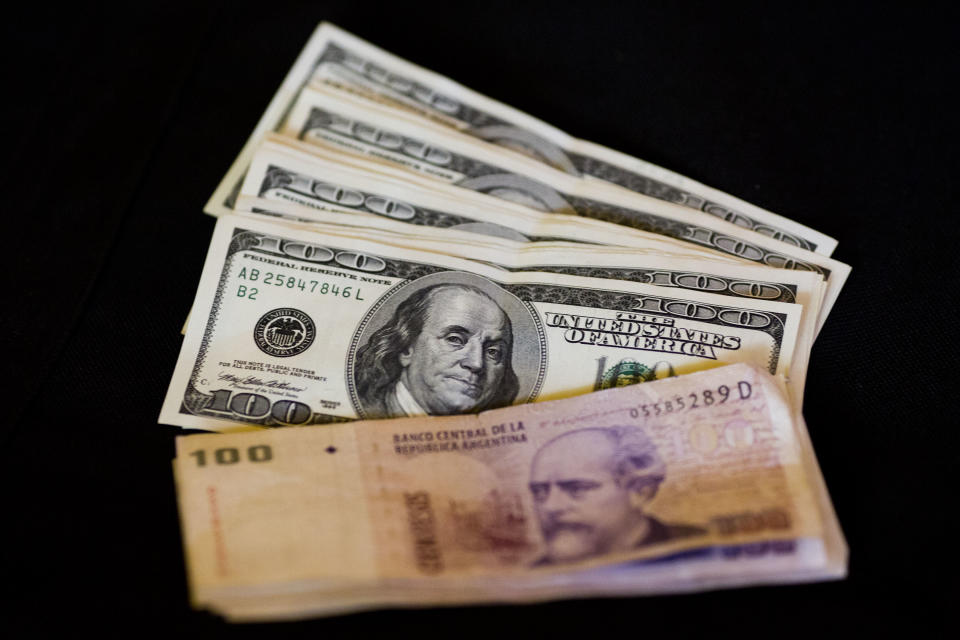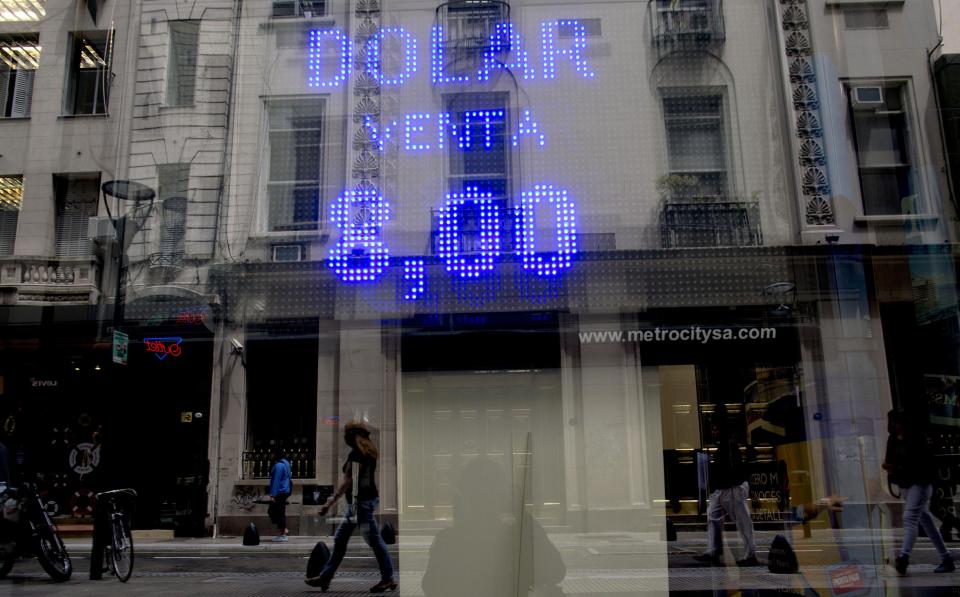Argentina relaxes controls on US dollars
BUENOS AIRES, Argentina (AP) — Argentina announced Friday it will relax restrictions on the purchase of U.S. dollars after the sharpest slide in the value of the local peso since the 2002 economic collapse.
Analysts said the devaluation was forced by a steady decline in the country's foreign exchange reserves, and it helped shake markets across the world as confidence in emerging markets slipped.
Argentines will be able to freely buy dollars starting on Monday, reversing a restriction imposed in 2012, and the surcharge on the exchanges will drop as well — to 20 percent from 35.
But the brief announcement by Cabinet Chief Jorge Capitanich made no mention of many other restrictions imposed over the past three years, such as those that have make it hard for businesses to import supplies or repatriate profits.
Many Argentines also were uncertain how the measure would be applied, or how the sudden slide in the peso would affect their trips abroad.
"I'm upset at having saved for something for so long and not being able to buy everything I wanted in the U.S. just for fear of not knowing what's next," said Camila Fernandez, a 20-year old law student who has been planning a vacation to New York for a year. "They don't clear up a thing. No one knows how this will be regulated."
Many travel agencies stopped taking orders Friday pending clarification, but otherwise business went on as usual.
The original currency restrictions were meant to stem the flood of dollars out of the country, but many economists say they undermined confidence in the peso.
Foreign reserves slipped 40 percent over the past 12 months to their lowest level in seven years.
That led the government to hold back from spending more hard currency to support the peso on the official exchange market on Wednesday and Thursday as the currency tumbled 16 percent against the dollar, falling to about 8 to 1. It had been 4.4 to 1 or better when the government began imposing the series of restrictions in 2011.
Economy Minister Axel Kicillof argued that the sharp fall was fed by speculators.
"Those interests want a dollar at 13 pesos and ... yesterday we had a very strong speculative attack," he told local Radio Continental, accusing Shell Oil of offering to buy dollars at 8.40 when the peso had been trading at 7.20.
Shell Argentina President Juan Jose Arangueren denied any speculation in comments to the newspapers La Nacion and Clarin.
After Friday's announcement, the black market dollar weakened to 11.8 from 13 pesos, while the official rate held roughly stable.
Independent economists said the effective devaluation this week will feed inflation running at near 30 percent a year. Sellers will have to raise peso prices to get the money needed to buy imported goods in dollars.
Kicillof, however, insisted, "It's a lie from any point of view that this will carry over to prices ... We hope the people understand that there have been strong movements of economic destabilization to set prices that are not prices."
Kicillof and Capitanich said purchases on the legal dollar market still must be in line with the income a person has declared to tax authorities. And many Argentines say that what they consider legitimate requests for dollars have been refused or delayed in recent years, pushing many to the black market.
Argentina has been kept from global credit markets since defaulting on its debt during its 2001-2002 financial crisis.
As the reserves have dwindled, Argentina also has tried to renegotiate its debt with foreign creditors. It presented a formal offer this week to the Paris Club on paying some $10 billion of debt it still owes to the group of creditor nations.
This week's developments in Argentina served as "a trigger" for a broader trend of investors shifting out of emerging markets, said Adolfo Laurenti, deputy chief economist at Mesirow Financial Holdings.
And that contributed to a sell-off in stock markets across the world on Friday. Madrid's stock market fell 3.64 percent, partly due to companies such as BBVA and Telefonica with interests in Argentina.
Argentines are haunted by memories of the financial crisis, when banks froze deposits and the currency lost value, so they have been eager for dollars to stash in vaults or even under their mattresses in case of an emergency.
"I'm sure that the dollar is going to spike up with this measure," said Malena Perez, 47, who owns a candy shop in downtown Buenos Aires.
She said government restrictions on imports have hurt her small business because she's no longer able to get her hands on popular potato chip brands made in the U.S. or chocolates from Switzerland.
"I don't trust this government. I find it hard to believe that you can buy dollars just like that," she said.
Helped by heavy spending by the leftist government, Argentina's economy was growing at a 7 percent yearly clip before slowing to what officials say was likely 5.1 percent growth last year, though independent analysts said it was actually less than 3 percent.
"The high pace of government spending must be slowed down, or else the reserves will continue to be squeezed and this implies feeding inflation and a loss of reserves in a short time. The peso would also continue to appreciate," said Aldo Abram, an economist at Buenos Aires-based Exante.
__
Associated Press writers Debora Rey in Buenos Aires and Luis Andres Henao in Santiago, Chile contributed to this report.



